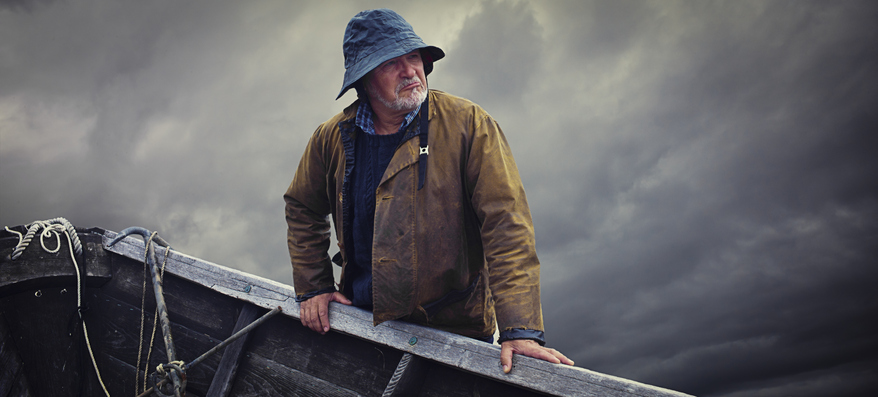For most of my life, I never thought much about fishing. I knew I enjoyed eating fish, but I never wondered how they were caught or who caught them. If I gave fishing any time in my head at all, it would have been to imagine a lazy summer afternoon, a line in a river, and a good long wait.
Then I moved to a small town on Cape Cod and—well, you can’t exactly escape thoughts about the ocean when you’re in a place called Land’s End, can you? And my town has a long and rich connection to the sea; once a whaling capital, it transformed into a Portuguese fishing village that, in its heyday, featured forty bustling wharves along the harbor. That’s changed now, of course; the commercial fishing fleet, which once numbered hundreds of vessels, is now down to little more than twenty. But it is still here, and people still make their living that way and believe me when I tell you that it’s absolutely nothing like throwing a line in a river on a hot day in July.
What fishermen do is hard, and it’s dangerous. If the winds are high and flinging sleet against exposed skin and the temperature hasn’t reached freezing in ten days, they go out. If they’re running a fever and are worried about the sound the motor was making last week, they go out. If they haven’t had a vacation in years and their families want to take off for the weekend, they go out.
Today’s Gospel reading is unusual in many ways, but not, I think, in its portrayal of fishermen.
I’m imagining the aftermath of the events of Holy Week and Easter. When someone important to us dies, it feels like the earth stands still, doesn’t it? The day after my mother died, I couldn’t believe I had to keep doing all the same things. How could I eat? How could I sleep? How could I go to work? How could I do all the ordinary things in a world that no longer had her in it? There’s a period of shock, a liminal time between Life With Them and Life Without Them.
But then, inevitably and necessarily, life does resume. The world doesn’t stop. You have to pay rent; you have to eat; you have to keep putting one foot in front of the other.
And that’s where we come upon the disciples. The shock of the crucifixion and the resurrection has worn off, and they have to get back to real life. Life would be different, of course; the three years they’d spent with Jesus, his death and resurrection, would change the world. But not yet. First, they have to find their footing in this new reality, and Peter has an immediate solution: go back home and go out fishing. That’s Peter’s normal.
Because that’s another thing about fishermen, the sea is where they feel they belong, where they’re most comfortable. Their first impulse is to find the waves.
So this group of disciples heads out to fish. To clear their heads. They go back out as if nothing happened. And that’s precisely what does happen: nothing. No fish. It’s not difficult to imagine their frustration as they’re heading back to shore.
Jesus stands there, waiting. His closest friends don’t recognize him, yet when he speaks, extraordinarily, Peter and the others obey a stranger who orders them to do something that makes no sense.
In my experience, no one can tell a fisherman what to do. The desperately hard lives they lead give them utter self-reliance. It seems to me, in reading this story, that there was something amazing about Jesus, something that deeply affected Peter and the others even when they didn’t recognize him as their Risen Lord. They knew without yet knowing.
The symbolism is there, of course: we’re familiar with what happens next; this passage precedes the one in which Jesus exhorts them to go out and become fishers of men.
But what strikes me here is the kindness of Jesus. He waits for them to come to shore, the brazier warm, already cooking breakfast for the tired and disheartened men. We—as individuals and as the Church—are called to see Christ in everyone we encounter, and to give Christ to the world. How else can we do that, but through acts of kindness? Jesus’ kindness challenges me, makes me wonder if that’s what I do if I do enough. I know how hard many people’s lives are, the rough seas we all encounter, the poor catches. Do I imitate Christ? Do I keep the brazier warm for others?
At a time when acts of kindness are so desperately needed in the world, when our particular rough seas and poor catch take the form of a virus and the loss of work, loss of closeness with others, loss of income, loss of security; at this particular time, keeping that brazier warm—sewing masks, donating to food banks, checking in on others via telephone—is the best way to be Jesus to the world.
Fishermen are determined to go out, no matter what the weather or the circumstances. We can borrow that same determination to show up for our brothers and sisters, to see Christ in them, and to be Christ to them. Keep that brazier warm.

Jeannette de Beauvoir is a writer and editor with the digital department of Pauline Books & Media, working on projects as disparate as newsletters, book clubs, ebooks, and retreats that support the apostolate of the Daughters of St. Paul at http://www.pauline.org.

